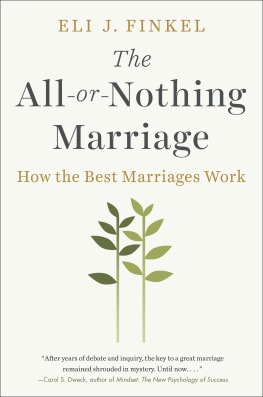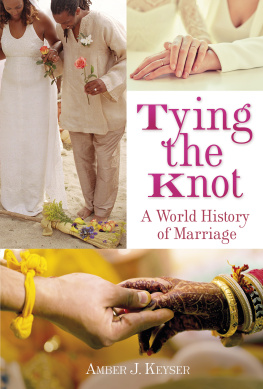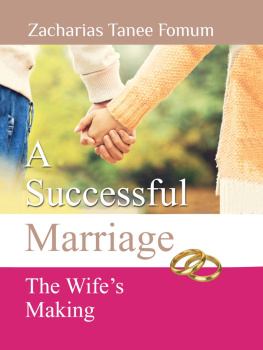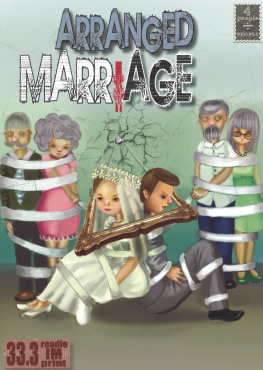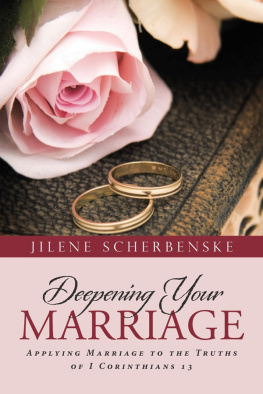Advance Praise for
The All-or-Nothing Marriage
This book makes a lot of sense, and it is written by an eminent scholar. It should be an essential part of every therapists bookshelf.
John M. Gottman, author of The Seven Principles for Making Marriage Work
An engaging, perceptive exploration of a modern paradox. We need marriage less than ever for practical survival and social success, but we demand more satisfaction and meaning from it than ever. The higher we climb in our emotional expectations, Finkel argues, the more oxygen we need to pump into our relationships.
Stephanie Coontz, author of Marriage, a History: How Love Conquered Marriage
Marriages are like rapids-filled rivers, sweeping us along toward desired destinations, both emotional and practical, while imperiling the journey with unseen rocks of ruin. With an account that is impressive in scholarship and erudition, Eli Finkel has provided a much-needed chart for understanding and navigating the waters.
Robert B. Cialdini, author of Influence and Pre-Suasion
Eli Finkels All-or-Nothing Marriage is an excellent, accessible guide to todays high-investment, high-reward marriages.
Andrew Cherlin, professor of sociology, director of the Program on Social Policy at Johns Hopkins University
What do we actually know about good (and bad) marriages? That simple question is surprisingly difficult to answer, but Eli J. Finkels The All-or-Nothing Marriage is the best place I know to start.
Tyler Cowen, economics professor at George Mason University and author of Average Is Over
While pundits debate the ever-evolving institution of marriage, Eli Finkel offers a fresh, nonpartisan analysis of changing trends and even practical advice for the long-coupled. Anyone in a committed romantic relationshipwhether or not theyre legally wedwill benefit from the generosity and care he brings to the topic.
Kate Bolick, author of Spinster: Making a Life of Ones Own
A thorough analysis of American marriage throughout the ages. In this comprehensive examination, Finkel... traces the evolution of this sacred institution from the earliest days of hunter-gatherer societies to modern times.... In addition to extensive research, the author bolsters the narrative with charts, diagrams, and numerous quotes from a variety of sources. As the author writes, it is possible to create a loving, lasting union, but it requires work, communication, and commitment on the part of both parties, and the process will change as time progresses.
Kirkus Reviews

An imprint of Penguin Random House LLC
375 Hudson Street
New York, New York 10014

Copyright 2017 by Eli J. Finkel
Penguin supports copyright. Copyright fuels creativity, encourages diverse voices, promotes free speech, and creates a vibrant culture. Thank you for buying an authorized edition of this book and for complying with copyright laws by not reproducing, scanning, or distributing any part of it in any form without permission. You are supporting writers and allowing Penguin to continue to publish books for every reader.
DUTTON is a registered trademark and the D colophon is a trademark of Penguin Random House LLC.
Photo credits: , The Grants: K.T. Grant
LIBRARY OF CONGRESS CATALOGING-IN-PUBLICATION DATA
Names: Finkel, Eli J., author.
Title: The all-or-nothing marriage : how the best marriages work / Eli J. Finkel.
Description: New York, NY : Dutton, [2017] | Includes bibliographical references and index.
Identifiers: LCCN 2017013524| ISBN 9780525955160 (hardcover) | ISBN 9780698411456 (epub)
Subjects: LCSH: Marriage. | Married people. | Interpersonal relations.
Classification: LCC HQ734 .F466 2017 | DDC 306.81dc23
LC record available at https://lccn.loc.gov/2017013524
Charts and Graphs by Daniel Lagin
While the author has made every effort to provide accurate telephone numbers, Internet addresses, and other contact information at the time of publication, neither the publisher nor the author assumes any responsibility for errors or for changes that occur after publication. Further, the publisher does not have any control over and does not assume any responsibility for author or third-party websites or their content.
Version_1
To my wife, Alison, who finds it hilarious that Im a marriage expert
Contents
PREFACE
Panic in Evanston
I was working hard to look relaxed, as if the two of us were just having a regular research meeting. Professors meet with graduate students all the time to work through the sorts of thorny conceptual issues that arise when writing articles.
Grace Larson had just finished her first year as a doctoral student at Northwestern, and she was looking to me for answers. But what she told me in that meeting had, in under an hour, shattered some of my most central assumptions about marriage.
Meanwhile, a deadline loomed. I had promised to submit a feature article presenting an ambitious new theory of marriage in America. The article, which would eventually clock in at a novella-length thirty thousand words, was due in October of 2013. Three of my students and I had divided up the initial tasks, and Larson was, in that meeting in June of 2013, reporting back to me on what she had learned.
The Invitation
Two months earlier, the psychologist Ronnie Janoff-Bulman had invited me to submit a Target Article for the scholarly journal Psychological Inquiry. This journal has a distinctive structure: Each issue consists of a Target Article, around a dozen expert Commentaries, and a Response to Commentaries from the authors of the Target Article.
I proposed an article on an idea Id been playing with: that diverse forces had increasingly freighted marriage in America over time, piling so much expectation and responsibility on this one relationship that it threatened to buckle under the strain. We Americans increasingly look to our spouse to be our best friend and closest confidant, to provide sizzling sex, to help us grow as individualsthe list goes on. At the same time, we spend less time with our friends, parents, and siblings, and we are less engaged in organized civic activities outside the home. Collectively, these forces place tremendous pressure on the marital bond, and few marriages are able to withstand the stress. Janoff-Bulman approved this topic, and my students and I started scouring the research literature for evidence that marriage is in trouble.
As social psychologists, our primary expertise revolves around the thoughts, feelings, and behaviors that enhance or undermine relationship quality. We study topics like commitment, forgiveness, and sexual desire, and we do so by collecting data on people who are involved in serious romantic relationships. Neither historians nor sociologists, we lack primary expertise on how the institution of marriage has changed over time. Larsons first task was to start delving into the history of marriage.
Her findings, as preliminary as they were, revealed that my central thesis was wrong. The idea that Americans have, over time, been asking more and more of our marriage sounds reasonable, but the historical record makes plain that we are, in crucial respects, asking less and less. During the colonial era, people looked to their marriage, and to the broader familial alliances linked to it, for things like food production, shelter, and health care; in a literal sense, they looked to their marriage to help them survive. Were asking a lot of our marriage today, but few of us are asking for life itself.

